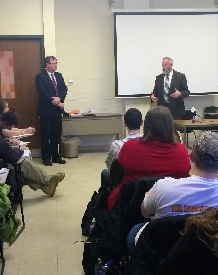EM Class Project with Tornado-Torn Washington, IL
March 27, 2014

Washington, IL, City Administrator Tim Gleason (right, at the front of the classroom) is working with Western Illinois University Emergency Management (EM) Assistant Professor Jack Rozdilsky (left, by the door) and students in EM 461 ("Business and Industry in Emergency Management"). Through the EM 461 course project, Rozdilsky and his students are examining and exploring factors that may influence the Tazewell County-based municipality's long-term economic recovery after the Nov. 17, 2013, tornado.
[Download Print-Quality Image]
Project to Produce Plan for Potential Use in City's Long-Term Economic Recovery
MACOMB, IL – In many cases, the recovery phase after a tornado starts in the spring and summer months, typically the time for twister season in the Midwest. But in the case of Washington, IL—which experienced an EF-4 level tornado Sunday, Nov. 17, last year—very little about that city's recovery has been textbook typical.
Washington City Administrator Tim Gleason talked about that fact when he presented to a Western Illinois University class of emergency management students in late February in Macomb. He also addressed another atypical situation—how WIU students, led by Emergency Management Assistant Professor Jack Rozdilsky, are serving as a helpful ongoing resource he and his fellow City of Washington officials and employees are utilizing to bring Washington back, Gleason described, as "stronger and better than it was the day before the tornado."
"Right after the disaster, it was one of those situations where I was getting business cards handed to me left and right, and I knew, with all the work ahead of us, I wasn't coming up for air anytime soon," Gleason said. "When Dr. Rozdilsky first talked to me, after one of our first public meetings following the tornado, it was only two to three minutes—yet he left enough of an impression on me that I thought, 'I am going to reach out to this guy at some point.'"
In late December, around Christmas—the first time Gleason was able to take a day off following the mid-November disaster—he made contact again with Rozdilsky. A few conversations later, a working relationship—between Rozdilsky and his EM 461 ("Business and Industry in Emergency Management") students and the City of Washington—and an economic-recovery data-gathering project officially begun.
Through the EM 461 course project, Rozdilsky and his students are examining and exploring factors that may influence the Tazewell County-based municipality's long-term economic recovery. This month and next, Rozdilsky and the Western EM students will be in the field gathering information. The plan is to be able to deliver some recommendations for Washington officials by the end of the Spring 2014 semester in early May.
"When it comes to business recovery after a tornado or natural disaster, what emergency management professionals typically observe is a business's physical infrastructure is destroyed—the roof is blown off, the walls are down or the structure is ruined. But in the case of Washington, that's not what happened. Most of the damage and destruction was to residential structures homes and apartment buildings, but businesses were largely left untouched by the tornado," Rozdilsky explained. "Yet there are struggles for the businesses, because many of them are dependent on a local customer base and that base has been impacted significantly. When you have a number of homes substantially damaged or are destroyed, that generally means people are not living in them and are living elsewhere until they can come home."
The timing of the Washington tornado affected the economics for the city's businesses, too, Rozdilsky noted.
"Shortly after the tornado, the winter season started, and as you know, this past winter has been particularly harsh. Some re-construction has started, but people have not yet moved back into the town en masse. So a question that many in the Washington community are asking has to do with the long-term economic recovery—essentially what happens when businesses have their customer bases interrupted or they lose their customer bases entirely," he added.
"As of this month, Washington is in its fourth month of disaster recovery. For city officials and the citizens of Washington, there are still so many issues to deal with, and they don't have the resources to get to them all. So, through the class, we're pitching in to provide them with some help," he said.
"My selfish hopes are this Spring 2014 class project turns into a Fall 2014 class project, possibly even into a Spring 2015 class project—that students in following classes can start where the current students working on the project leave off," Gleason added. "We're in this for the long haul, and the information and recommendations provided to us through Dr. Rozdilsky and the EM students at Western can only help us get us to that point where we're as good as, if not better, than we were November 16, 2013."
For more information about this emergency management faculty-led community-outreach project in Washington, see www.wiu.edu/coehs/health_sciences/undergraduate_programs/em/02-2_cevent-2_03-24-14.php, or contact Rozdilsky at (309) 298-1621 or via email at JL-Rozdilsky@wiu.edu.
Learn more about WIU's emergency management bachelor's degree program — one of only 15 of its type in the U.S. — at www.wiu.edu/coehs/health_sciences/undergraduate_programs/em/index.php.
Posted By: Teresa Koltzenburg (WIUNews@wiu.edu)
Office of University Communications & Marketing

Connect with us: